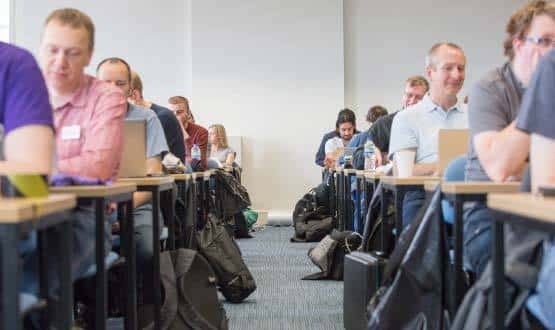Raspberry Pi-based EPR in a box wins NHS Hack Day 13
- 23 May 2016

A go anywhere, Raspberry Pi-based, electronic patient record in a box for emergency medical teams to use when responding to emergencies like the Ebola outbreak, won the latest NHS Hack Day London.
The 'Outbreak' system is designed for use in contaminated ‘dirty rooms’ in which medical staff treating patients must wear hazard suits and from which no equipment, even pieces of paper, can leave the room.
“We wanted to design a system so that a response team has a fully functioning IT system on the back of their Land Rover,” said Dr Michael Marks, an epidemiologist member of the team, who has worked for organisations such as Medecins Sans Frontieres.
“We were aiming for an IT system that has no support, is totally disposable, and from which you can trade out any part at any time.”
The winning system uses Android tablets, USB sticks and a Raspberry Pi Server in a plastic box. Together, these should work in resource strapped environments, where there is no network, no power, no IT support and little infrastructure.
The tablets are designed to be used by staff in field pathogen hazard suits and burned after use.
NHS Hack Day 13, tag-lined ‘geeks who love the NHS’, attracted a diverse mix of mostly young doctors, nurses, developers, designers and data scientists for two days of brainstorming, hacking and prototyping.
Nineteen diverse projects conceived on Saturday were presented by Sunday afternoon, ranging from a virtual reality analgesia project for amputees to a FHIR blood test flowsheet, and from a digital anesthetic chart linked to monitors to a free English medical spell check.
Second prize went to the Daily Pollute, an app designed to help Londoners track daily pollution exposure levels, and find a route to work that would help them to avoid pollution hot spots.
The app combines Google’s tracking API and live public data – via the London Air API – to enable users to get a breakdown of individual particulate levels, and compare then to World Health Organisation risk levels. Pollution has a huge health impact on a range of conditions, including cardiovascular disease.
Third place went to the child and mental health services bed finder, which is designed to make it easier to find mental health inpatient beds for young people.
The app sends a request to the five closest hospitals, where the bed managers at each can see the request and referral. Once accepted, this disappears from the other hospitals’ lists.
A further special commendation for patient focused development went to the virtual reality analgesia project for amputees, which enables amputees to see a missing limb. This is a proven analgesia technique for phantom limb syndrome, where people have pain in missing limbs.
David Miller of Open Health Care UK, one of the organisers of NHS Hack Day 13, said: “I thought the weekend was great, we had a real sense of excitement in the room throughout.”
On the range of projects, Miller said: “We had a few old favorites – replacing the bleep and managing beds for instance. The fact that these keep coming up is a strong signal that they’re still major unsolved problems in the NHS.
“There were also plenty of new ideas – and this time round many of the projects were particularly well polished.
“The maturing open source tools and platforms that help developers build high quality products for a clinical setting mean that we’re seeing teams able to do more in less time. That’s exciting not just for NHS Hack Day, but for the NHS at large.”
The main organiser for NHS Hack Day 13 was junior doctor Helen Jackson, who thanked everyone for they’re “amazing contributions” to the event.
Digital Health editor Jon Hoeksma was one of the judges and Digital Health was a sponsor of the event. Mark Miller blogged from the event, and further blogs are available from Dr Keith Grimes and Becky Rush.




